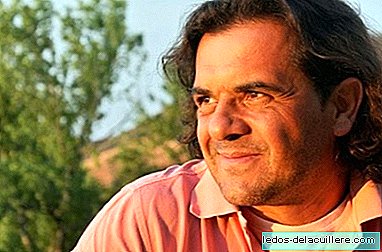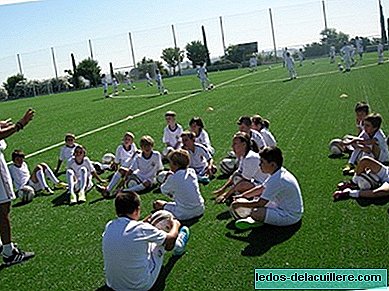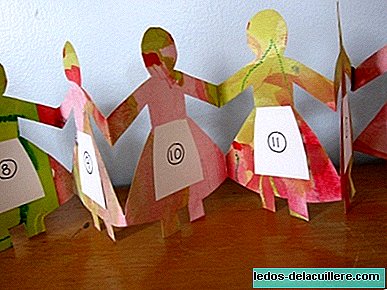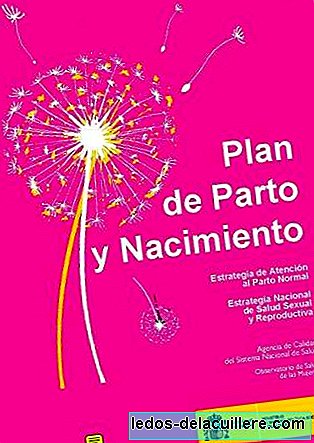
As you know one of the topics that interest me most is to offer parents tools to educate children in a respectful way and I have found the book of the psychologist so interesting Antonio Ortuño that I wanted to get a little closer to his work and his proposals in an interview.
What is your job as a child psychologist?
I have been working for more than twenty years teaching families respectful strategies and good practices so that they learn to face the problems related to education in childhood and adolescence. I work together with fathers and mothers so they feel competent and learn tools and skills to intelligently exercise their function.
And what is the role of the family?
The family's function is mainly to provide security for the children.
A child surely wants to grow up, wants to take responsibility, wants to please and be the protagonist of his story. Learn to know and accept their limitations and possibilities, to love and love, to manage their decisions and risks, to be consistent, to face new challenges and realities, to relate to others with empathy and assertiveness. Come on, a luxury.
And how is safety provided to children?
There would be like two big pillars. A pillar would be full of love, love, availability, protection, care, unconditional acceptance. Another pillar must contain the rules of coexistence, the distribution of responsibilities and decisions, the management of trust and respect, the parameters of freedom, conflict management. Both pillars are necessary to foster a secure attachment.
And of these two functions, which one do you think is most flawed in this society?
The families that I attend in therapy and in my training courses have raised in heartbreak or lack of control, or both. But I think that the lack of control fails more. Loving and loving our children generates less doubts for parents than how to exercise control to manage disagreements. I have more work experience in how to rebuild a secure attachment by strengthening credibility and consistency in educational guidelines.
Does this last sound like setting limits?
The child, among other things, is born with a system to capture and develop information that requires an external monitoring system to mature. The need for children to explore, to know the world around them, must be realized in a security context where hazards are minimized, and one way is to offer that freedom, but with some parameters, limits. In order to foster responsibility, one has to learn to make decisions. And to be able to make decisions it is necessary to have the feeling of control over the situation, and to know the alternatives and the consequences of those alternatives, in addition to making them feel competent with large doses of empathy. For me this is what it means to set limits.
You talk about sharing decision making in the family, is there a recipe?
Education consists in continually asking yourself, what am I deciding for my son, could he decide now? When a baby is born, all decisions are made by adults. Everything is in the parental control zone. But adults should gradually share and delegate those decisions. In the beginning the control is of the adult. We decide for example, what clothes you buy. But sooner or later the children will want to be protagonists and participate in decision making. The control at that time must be shared. And he wants to negotiate the purchase of his clothes, or his way of dressing. And finally, the responsibility belongs to the child, he already wants to decide. The control is yours. You saw his style.
Is that the smart traffic light technique you refer to in your book?
Exactly. It is a technique that helps families differentiate three situations, which would be the three colors of the traffic light: RED traffic light: control of the situation is held by the adult. The child cannot make decisions, as it can jeopardize the well-being of some person, especially his. It is something that cannot be tolerated or accepted. It is the space where authority is exercised, taking into account the position and opinion of the other. I have called it empathic authority. They are situations where negotiation does not fit. He is a friendly, respectful NO. And the NO are non-negotiable. YELLOW traffic light: situation control can and should be shared. Both the adult and the minor can make decisions. Children are trusted and their decision making is respected. One of the parties may not like it at all, but it can be accepted and tolerated. It is a negotiable situation, where you have to reach compromises, with a cooperative vision looking for both parties to earn something. From different points of view an agreement is reached, proportionally, although a bit asymmetrically. It's something like that: you decide what I decide you can decide. But, as a final result, the decision has to be the son's. GREEN traffic light: control of the situation and the responsibility is entirely of the child. The child makes decisions that affect his life project, not that of his parents. Whatever adults say, children are the ones who ultimately decide. Parents learn to accompany, to get behind on their trip, to be available when the child (not the parents) deems it convenient, to show confidence when they have to decide and, very importantly, the child must and must perceive that they are respected those decisions.
Why the name of intelligent families to your book and your project?
The etymology of the word intelligence is of intelligent Latin origin, composed of intus (between) and legere (choose). To be intelligent, among other things, is to know how to choose the best alternative, is to anticipate, is to know how to predict.
The intelligent family knows how to make decisions, knows how to solve the problems that affect the survival and well-being of its members. Its objective is to provide security and credibility to children in a loving and structured context.
The intelligent family ensures healthy child growth. It helps children to properly process the immense amount of information they receive daily, learning to discriminate and inhibit the irrelevant, to adapt to different realities, to anticipate and make predictions of their behavior, to regulate their behavior and emotions, to be planned. In short, to be responsible. Therefore, it is necessary for parents to provide their children with situations to solve, offering alternatives with their consequences so that the child's brain can make decisions, can anticipate, can imagine the future. It is the best way for me to mature happily.
We greatly appreciate the psychologist Antonio Ortuño the interview he has given to Babies and more and I take this opportunity to recommend your interesting book "Smart Families" again.












